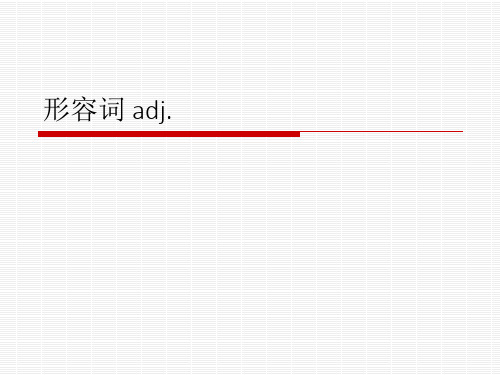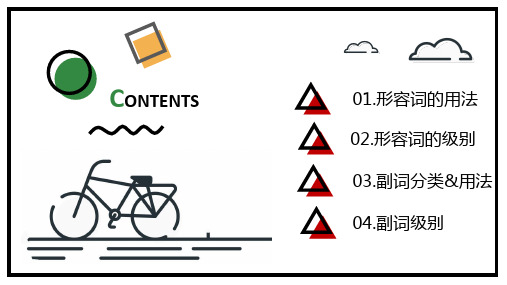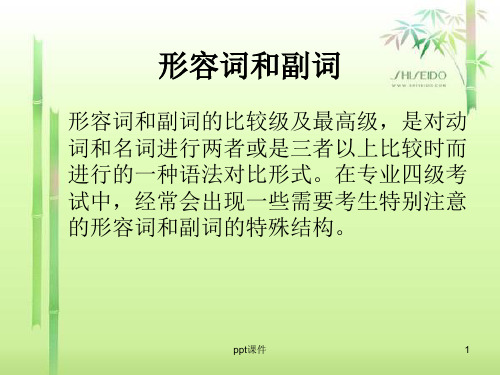大学英语语法3——形容词.ppt
合集下载
英语中形容词的用法ppt课件

;.
18
• tall – taller – tallest
• narrow – narrower – narrowest
• small
• young
• New
• long
smaller
younger newer
longer
smallest youngest newest
longest
;.
19
2) 以字母 e 结尾加 –r 或 –st fine – finer – finest late – later – latest nice – nicer – nicest
good(好)---better(更好) tall(高)---taller(更高), old(旧)--older(更旧), many/much(多)—more(更多)等。 Tom is taller than Bob. I am taller than my brother.
;.
16
③ 最高级:用来比较三个或三个以上的人或物。 small(小的)---the smallest(最小的) tall(高的) ----the tallest(最高的) new(新的)--- the newest(最新的) good(好)---the best(最好)
;.
20
• wide – wider – widest
• rude
• brave
ruder
• able
braver
abler
rudest bravest ablest
;.
21
为 i 加 –er 或 –est early – earlier – earliest easy – easier – easiest lucky – luckier – luckiest
大学英语语法PPT(全)

词(article)、数词(numeral)、介词(preposition)、代词 (pronoun)、连词(conjunction)、副词(adverb)等词类的 用法 句法:一般规则的用法和特殊规则的用法
3/4/2023
1、名词(n.): 表示人、事物、地点或抽象概念的名称。如:boy, morning, bag, ball, class, orange.
----《不列颠英语用法大全》
3/4/2023
“语言的科学和艺术” -----英国著名语言学
H.Sweet
3/4/2023
两个目标、三个阶段:
高级阶段
过渡阶段
能
初级阶段
练知↑
由此看出学习语法知识是第一步,通过不断的练习才能实现向语言能力的转 换,最终达到言语交际的目的。
3/4/2023
外语语法学习示意图: 高级阶段 过渡阶段 初级阶段
second, third, fourth. 5、动词(v.): 表示动作或状态。如:am, is,are,have,see . 6、副词(adv.): 修饰动词、形容词或其他副词,说明时间、地点、程度等。如:
now, very, here, often, quietly, slowly. 7、冠词(art..):用在名词前,帮助说明名词。如:a, an, the. 8、介词(prep.): 表示它后面的名词或代词与其他句子成分的关系。如in,
daughter out?
3/4/2023
这位父亲问他女儿的男朋友(其正准 备开车带他女儿出门):Do you drink?他真正的意思是问这个年轻男子 是否有饮酒的习惯,即在询问情况, 而不是问他现在想不想喝酒,即不是 在提议。
3/4/2023
3/4/2023
1、名词(n.): 表示人、事物、地点或抽象概念的名称。如:boy, morning, bag, ball, class, orange.
----《不列颠英语用法大全》
3/4/2023
“语言的科学和艺术” -----英国著名语言学
H.Sweet
3/4/2023
两个目标、三个阶段:
高级阶段
过渡阶段
能
初级阶段
练知↑
由此看出学习语法知识是第一步,通过不断的练习才能实现向语言能力的转 换,最终达到言语交际的目的。
3/4/2023
外语语法学习示意图: 高级阶段 过渡阶段 初级阶段
second, third, fourth. 5、动词(v.): 表示动作或状态。如:am, is,are,have,see . 6、副词(adv.): 修饰动词、形容词或其他副词,说明时间、地点、程度等。如:
now, very, here, often, quietly, slowly. 7、冠词(art..):用在名词前,帮助说明名词。如:a, an, the. 8、介词(prep.): 表示它后面的名词或代词与其他句子成分的关系。如in,
daughter out?
3/4/2023
这位父亲问他女儿的男朋友(其正准 备开车带他女儿出门):Do you drink?他真正的意思是问这个年轻男子 是否有饮酒的习惯,即在询问情况, 而不是问他现在想不想喝酒,即不是 在提议。
3/4/2023
英语-形容词ppt课件

2023最新整理收集 do something
Adjective
一.形容词的概念
• 形容词是用来修饰和描述名词,通 常放在名词之前
a blue cap
a big orange
形容词既可修饰单数也可修饰复数
a red strawberry three red strawberries
2.形容词可以放在 be 动词之后,用来 叙述和说明主语
fast — slow
Young—old
tall—short
高的 - 矮的
fat—thin
胖的 - 瘦的
strong—weak happy—sad
结实的 - 虚弱的
快乐的 - 悲伤的
young—old new—old
年轻的 - 年老的 新的 —旧的
long—short
长的 — 短的
big—small
大的 — 小的
big—little
大的 — 小的
dry—wet
干的 — 湿的
good—bad
好的 — 坏的
full—empty
满的 — 空的
hot—cold
热的 — 冷的
clean—dirty
干净的 — 脏的
warm—cool
温暖的 — 凉爽的
fast—slow
快的 — 慢的
thick—thin light—heavy ill — well sweet — bitter
one of the + 形容词最高级 + 复数名词
表示“……是……中最……之一”。
Beijing is one of the largest cities in China.
Which is +the+ 最高级+……?在…(范围内)哪一个最…?
Adjective
一.形容词的概念
• 形容词是用来修饰和描述名词,通 常放在名词之前
a blue cap
a big orange
形容词既可修饰单数也可修饰复数
a red strawberry three red strawberries
2.形容词可以放在 be 动词之后,用来 叙述和说明主语
fast — slow
Young—old
tall—short
高的 - 矮的
fat—thin
胖的 - 瘦的
strong—weak happy—sad
结实的 - 虚弱的
快乐的 - 悲伤的
young—old new—old
年轻的 - 年老的 新的 —旧的
long—short
长的 — 短的
big—small
大的 — 小的
big—little
大的 — 小的
dry—wet
干的 — 湿的
good—bad
好的 — 坏的
full—empty
满的 — 空的
hot—cold
热的 — 冷的
clean—dirty
干净的 — 脏的
warm—cool
温暖的 — 凉爽的
fast—slow
快的 — 慢的
thick—thin light—heavy ill — well sweet — bitter
one of the + 形容词最高级 + 复数名词
表示“……是……中最……之一”。
Beijing is one of the largest cities in China.
Which is +the+ 最高级+……?在…(范围内)哪一个最…?
英语语法第三课PPT教学课件

2020/12/11
PREV.
NEXT
8
三 形容词、副词的比较级和最高级
(一) 比较级和最高级的构成 注意:有些形容词,副词的比较级和最高级变化 是不规则的,需要个别记
2020/12/11
5
(一)副词的用法
副词是一种用来修饰动词、形容词、副词或全句的词,说明时间、 地点、程度、方式等概念。副词在句中主要充当状语,有时也可 以用作表语和补语,如: It is snowing outside; you’d better drive carefully.外面在下雪,你 最好小心驾驶。(作状语) Nobody was home yesterday.昨天家里没有人。(作表语) I want to ask you out tonight.我今晚想约你出去。(作补语)
注:enough修饰形容词或副词时,位于被修饰的形容词或副词之后。 4 修饰全句的副词通常位于句首,有时也可以放在句尾,如:
Unfortunately I failed in the exam.很遗憾,我考试没及格。
2020/12/11
PREV.
NEXT
7
(三)多个副词的排列顺序
1 多个时间副词或地点副词连用时,要遵循小单位在前,大单位在后的原则, 如: I came to the United States in December 1990.我于1990年12月来到美国。
2020/12/11
PREV.
NEXT
2
(二)形容词的位置
1 形容词前置 形容词作定语时通常位于被修饰词之前,如: a clean classroom, an attractive lady, a fashionable dress
形容词、副词用法及比较级和最高级的用法完整ppt课件

整理版课件
22
4、用or连接两项需作比较的内容时,须用比 较级;若or连接三项或三项以上的内容时,则须 用最高级。
Who is taller, Mary or Jane?
Which is biggest, the sun, the moon or the earth?
整理版课件
23
5、掌握几种同义句转换
整理版课件
18
1、the 最高级+of (in)…
Hong Jinbao Zheng Zeshi Nutty
Zheng is fatter than Hong.
Nutty is the fatt整e理s版t课o件f the three.
19
Noodles are more delicious than dumplings. The cake is the most delicious of all.
整理版课件
21
3、表示“最……之一”和“第……个最……”时 one of +最高级+名词复数 the first/second/third+最高级+名词单数。
Lu Xun is one of the greatest writers last century. The Yellow River is the second longest river in China.
整理版课件
6
副词的构成
有许多副词是对应的形容词加ly构成,如:
strong -- strongly
real -- really
词尾是y的要把y变为i再加 ly,
busy -- busily
happy -- happily
【精品】大学英语语法3——形容词ppt课件

When we make a comparison of quantity, we use the structure “as + much/many n. + as” or “as + few/little n. + as”
• I earn much money. • My son earns much money. • I earn as much money as my son does.
attributive adjectives predictive adjectives the big house → The house is big.
a popular singer → The singer is popular.
Some words can only be used as predictive adjectives. They have no degree of comparison and cannot be modified by degree adverbs such as too, very, much, almost, nearly, enough, hardly and so on.
• The task is prior to all others. • Health without riches is preferable to riches without
health.
The superlative degree compares more than two nouns or pronouns. It is the highest degree of comparison for adjectives, usually formed either by adding -est to the shorter words (kindest, fastest) or by putting most before longer words and adverbs (most extraordinary, most quickly). We use the definite article ‘the’ while using the superlative degree.
最新形容词专讲PPT课件

• This story is the most interesting of the three.
• 2. one of the+形容词最高级+名词复数 • 它的意思是最…之一。
• English is one of the most important languages in the world.
• 7.“比较级+and+比较级” 表示“越来 越…”
• China is becoming more and more beautiful.
• Days are getting longer and longer. • 8.用the+比较级,the+比较级 表示”越…
就越…”.
• The busier he is, the happier he feels.
• John is stronger than any other boy in his class.
• =John is stronger than any of the other boys.
• 两者不属于同一范畴,不能用other.
• Chongqing is bigger than any city in Sichuang.
• 形容词比较等级用法: • 1.没有比较对象时,用原级。 • I have a new computer. • 2.两者比较,程度相同。 • A+系动词+as+adj.+as+B. • Our school is as beautiful as theirs. • 3.两者比较,程度不同。 • A+系动词+not as+adj.+as+B. • The weather here is not as hot as the
• 2. one of the+形容词最高级+名词复数 • 它的意思是最…之一。
• English is one of the most important languages in the world.
• 7.“比较级+and+比较级” 表示“越来 越…”
• China is becoming more and more beautiful.
• Days are getting longer and longer. • 8.用the+比较级,the+比较级 表示”越…
就越…”.
• The busier he is, the happier he feels.
• John is stronger than any other boy in his class.
• =John is stronger than any of the other boys.
• 两者不属于同一范畴,不能用other.
• Chongqing is bigger than any city in Sichuang.
• 形容词比较等级用法: • 1.没有比较对象时,用原级。 • I have a new computer. • 2.两者比较,程度相同。 • A+系动词+as+adj.+as+B. • Our school is as beautiful as theirs. • 3.两者比较,程度不同。 • A+系动词+not as+adj.+as+B. • The weather here is not as hot as the
专升本英语形容词PPT

tired---more tired --- most tired interesting --- more interesting ----
most interesting
不规则变化
good --- better --- best bad ---- worse ---- worst little ---- less ---- least
当多个形容词修饰同一个名词时的顺序 1. 限定词the 等 2. 外观eg.大小胖瘦等 3. 形状类形容词 4. 新旧,年龄类形容词 5. 颜色类形容词 6. 来源,国籍,地区,出处类形容词 7. 物质,材料,之地类形容词 8. 用途类,功能类形容词 that hight young England girl
特殊的形容词
1. 表语形容词 表语形容词是是一般只用于系动词之后作表语的形
容词,这类常见的系动词(参见系动词p31) Does it get easier? It is going to become even worse.
常见的表语形容词:某些以 a-开头的形容词: afraid , alive , alone , ashamed , asleep , awake ,alike , aware …这类形容词不能放在 名词前面做前置定语。
(2)以 e 结尾的单词直接在词尾接 r 和 st ,分别构 成比较级和最高级
large— larger — largest late — later — latest safe — safer — safest (3) 以辅音字母 + y 结尾的词,先变 y 为 i ,再加
er 和 est 分别构成比较级和最高级 heavy— heavier— heaviest happy — happier —— happiest
most interesting
不规则变化
good --- better --- best bad ---- worse ---- worst little ---- less ---- least
当多个形容词修饰同一个名词时的顺序 1. 限定词the 等 2. 外观eg.大小胖瘦等 3. 形状类形容词 4. 新旧,年龄类形容词 5. 颜色类形容词 6. 来源,国籍,地区,出处类形容词 7. 物质,材料,之地类形容词 8. 用途类,功能类形容词 that hight young England girl
特殊的形容词
1. 表语形容词 表语形容词是是一般只用于系动词之后作表语的形
容词,这类常见的系动词(参见系动词p31) Does it get easier? It is going to become even worse.
常见的表语形容词:某些以 a-开头的形容词: afraid , alive , alone , ashamed , asleep , awake ,alike , aware …这类形容词不能放在 名词前面做前置定语。
(2)以 e 结尾的单词直接在词尾接 r 和 st ,分别构 成比较级和最高级
large— larger — largest late — later — latest safe — safer — safest (3) 以辅音字母 + y 结尾的词,先变 y 为 i ,再加
er 和 est 分别构成比较级和最高级 heavy— heavier— heaviest happy — happier —— happiest
英语形容词和副词ppt课件

He made us happy.
做状语
作状语,表示伴随、原因、结果等。
eg.He went to bed , cold and hungry .
She后置:
A. 修饰some, any, no, every 等构成的复合不定代词要后置。 something new; nothing serious; anything interesting
PART TWO
形容词级别
1.规则形容词的比较级和最高级(4种)
⑴直接加-er , -est :
young
clever
brave
younger cleverer
braver
youngest cleverest
bravest
⑵辅音字母 + y 结尾的变 y 为 i 再加 -er、-est :
happy
B.interesting,be interested
C. interested; be interesting D. interesting; interest
3.I’m very_____ on hearing the_______ news.
A.surprised, surprising B.surprising, surprised
............的
1.通常放在名词之前
a blue cap
a big orange
形容词既可修饰单数也可修饰复数
a red strawberry three red strawberries
2.可以放在 be 动词之后 This suit is yellow. These suits are yellow. The apple is red . The apples are red .
做状语
作状语,表示伴随、原因、结果等。
eg.He went to bed , cold and hungry .
She后置:
A. 修饰some, any, no, every 等构成的复合不定代词要后置。 something new; nothing serious; anything interesting
PART TWO
形容词级别
1.规则形容词的比较级和最高级(4种)
⑴直接加-er , -est :
young
clever
brave
younger cleverer
braver
youngest cleverest
bravest
⑵辅音字母 + y 结尾的变 y 为 i 再加 -er、-est :
happy
B.interesting,be interested
C. interested; be interesting D. interesting; interest
3.I’m very_____ on hearing the_______ news.
A.surprised, surprising B.surprising, surprised
............的
1.通常放在名词之前
a blue cap
a big orange
形容词既可修饰单数也可修饰复数
a red strawberry three red strawberries
2.可以放在 be 动词之后 This suit is yellow. These suits are yellow. The apple is red . The apples are red .
形容词和副词英语语法讲解PPT

• 4.与定冠词一起表示某一类人或物, 如: • The rich and the poor live very different lives . • 5.作状语,表示伴随、原因、结果等。如: • He went to bed , cold and hungry .
二、副词
• (一)副词的作用 • 1.作状语,修饰动词、形容词、副词或整 个句子。如: • He had worked hard all his life .(修饰动词) • He is very diligent.(修饰形容词) • You can find books on that subject quite easily .(修饰副词) • Luckily she was in when I called .(修饰句 子)
C. “enough”作定语时一般放在中心词前;但作 副词时只能后置。 We have enough food to eat. She is old enough to go to school. D. 以 a- 开头的形容词做定语要后置。如:alike, alive, alone, asleep, afraid, awake… 如:He is the only man awake at that time. E. 某些形容词,如: present (在场的,出席的), involved(有关的), concerned (相关的), left (剩下 的), mentioned (提及的), selected (当选的)等。 如: the students present (出席的学生) the cost involved (所需费用)
beautifully She is always dressed ____________. 2. 形容词修饰名词;副词修饰形容词,副词和全句。 He has got a serious illness.(名词) He is seriously ill.(形容词) You can find books on that subject quite easily .(副词) Luckily she was in when I called.(句子)
英语中的形容词ppt

But the most important argument for a broad education is that in studying the accumulated wisdom of the ages, we improve our moral sense. I saw a cartoon recently which depicts a group of businessmen looking puzzled as they sit around a conference table; one of them is talking on the intercom: ―Miss Baxter,‖ he says, ―could you please send in someone who can distinguish right from wrong ?‖ In the long run that’s what education really ought to be about. I think it can be. My college roommate, now head of a large shipping company in New York, not surprisingly was a business major. But he also hosted a classical music show on the college’s FM station and listened to Wagner as he studied his accounting.
While it’s true all of us need a career, preferably a prosperous one, it is equally true that our ization has collected an incredible amount of knowledge in fields far removed from our own. And we are better for our understanding of these other contributions—be they scientific or artistic. It is equally true that, in studying the diverse wisdom of others, we learn how to think. More importantly, perhaps, education teaches us to see the connections between things, as well as to see beyond our immediate needs. Weekly we read of unions that went on strike for higher wages, only to drive their employer out of business. No company, no job. How shortsighted in the long run.
形容词英语语法 ppt课件

4.只能作后置定语的形容词 1) 形容词修饰由some-,any-,every-, no-等和-body/one/thing等组合的复合不 定代词时,须后置。 e.g. something new anybody present 2) 某些以-able和-ible结尾的形容词作定语 时常常后置。 e.g. imaginable/ possible/available等。
f. 表示年龄、新旧、温度的形容词 (young/new/old/cold/hot) g. 表示颜色的形容词(red/white/black) h. 表示国籍、产地、区域的形容词 (Chinese/American/British) i. 表示材料、用作形容词的名词 (iron/silk/stone/fuel) j. 动名词、分词 (floating/hand-made) OPSHACOM 限冠形龄色国材(县官下令杀国材)
ppt课件 18
这些高大年轻的美国警察 these tall young American policemen 美丽的古老欧洲大教堂城市 the beautiful old European cathedral cities 所有十个年轻力壮的中国男学生 all the ten strong young Chinese boy students 头三幢既漂亮又宽敞的陈旧英式红石头 农场房子 the first three fine big old red English stone plantation houses
ppt课件 12
【注】 形容词enough修饰名词时既可放在名词 前,也可位于名词后。 e.g. There was just enough room for two cars. There will be time enough to tell you when we meet. 但enough作副词修饰形容词或副词时, 应当后置。 e.g. We should wait patiently before he was old enough to shave. 13 ppt课件
大学语法之形容词.ppt

三、作前置定语和后置定语意义不同的形容词
present, proper, due, concerned, involved, adopted, used, elect, responsible, opposite
[作前置定语]目前的,现在的
1. present
[作后置定语]在场的,出席的
The present situation is excellent. The employees present should vote on the issue.
8. elect
[作前置定语]挑选的,精选的 [作后置定语]当选的,选出尚未就职的
This elect body (选出的机构)meets once a year. The president elect takes over in May.
9. responsible [作前置定语]有责任心的,认真负责的
四、可用作副词的形容词
有些形容词有时可作副词,常见的有dark, dead,
wide, right, bitter, white, new, tight, pretty, damned, precious 等。
深红色 极冷 大开的 非常高兴
dark red dead cold wide open right glad
世俗的 学者气的 苍白的
高明的, 熟练的
六、表示肯定意义的too…to结构
“too…to…”结构本来表示的是否定含义,但是如果 前面有only, all, but, not, never, simply, just等词,too 后面是eager, anxious, pleased, kind, willing, apt, ready, glad, quick, inclined等形容词时,这是这个结构表示 肯定概念。
- 1、下载文档前请自行甄别文档内容的完整性,平台不提供额外的编辑、内容补充、找答案等附加服务。
- 2、"仅部分预览"的文档,不可在线预览部分如存在完整性等问题,可反馈申请退款(可完整预览的文档不适用该条件!)。
- 3、如文档侵犯您的权益,请联系客服反馈,我们会尽快为您处理(人工客服工作时间:9:00-18:30)。
attributive adjectives predictive adjectives the big house → The house is big.
a popular singer → The singer is popular.
Some words can only be used as predictive adjectives. They have no degree of comparison and cannot be modified by degree adverbs such as too, very, much, almost, nearly, enough, hardly and so on.
Most adjectives with initial letter a- are predictive
adjectives, such as afraid,alike,alive,alone, asleep,awake, ahead, ashamed etc.
And some others are ill, well, faint, glad, pleased, sorry, sure, certain, unable, ready, fond and so on.
• The positive degree, the adjective in its most basic form, indicates no increase or diminution of the original quality.
We are lucky. I have something im story is interested. • My story is very interested. • Your story is not so interested as mine.
When we make a comparison of quantity, we use the structure “as + much/many n. + as” or “as + few/little n. + as”
Adjectives
• An adjective is a word that modifies a noun or a pronoun by limiting its meaning. It tells a characteristic or quality of a noun or pronoun. Adjectives tell such things as which one? what kind? whose? how many/much?
The girl married.
•
The girl was poor.
•
She married immediately.
•
She married after graduation.
Now, you may combine all these details into one sentence.
• The poor girl married immediately after graduation.
Modifiers
A modifier is any word that acts to describe or qualify another word in such a way that it enriches the other words meaning. It usually may be an adjective, an adverb or a prepositional phrase. Adding modifiers can make sentences more explicit, more interesting and more powerful. Let’s look at an example.
College English Grammar:
Grammar and Writing
By Zhu Xiangjun
Unit 3
Modifiers: adjectives
• Grammar: Adjectives • Writing:
Correcting: Comparison Problems Rewriting: How to rewrite sentences
• The dog is asleep. → an asleep dog • The boy was ill. → an ill boy
1 Degrees of comparison
• Many adjectives have different forms to indicate their degree of comparison. There are three levels of comparison: positive, comparative, and superlative.
To compare people, places, events or things, when they are equal, we use as + adj. + as; when they are unequal, we use not so/as+ adj. + as.
• Summer in England is lovely. • Spring in China is lovely. • Summer in England is as lovely as spring in China.
• Generally, adjectives may be classified into two: one is attributive adjectives which are placed before nouns and the other is predictive adjectives which are placed after link verbs.
a popular singer → The singer is popular.
Some words can only be used as predictive adjectives. They have no degree of comparison and cannot be modified by degree adverbs such as too, very, much, almost, nearly, enough, hardly and so on.
Most adjectives with initial letter a- are predictive
adjectives, such as afraid,alike,alive,alone, asleep,awake, ahead, ashamed etc.
And some others are ill, well, faint, glad, pleased, sorry, sure, certain, unable, ready, fond and so on.
• The positive degree, the adjective in its most basic form, indicates no increase or diminution of the original quality.
We are lucky. I have something im story is interested. • My story is very interested. • Your story is not so interested as mine.
When we make a comparison of quantity, we use the structure “as + much/many n. + as” or “as + few/little n. + as”
Adjectives
• An adjective is a word that modifies a noun or a pronoun by limiting its meaning. It tells a characteristic or quality of a noun or pronoun. Adjectives tell such things as which one? what kind? whose? how many/much?
The girl married.
•
The girl was poor.
•
She married immediately.
•
She married after graduation.
Now, you may combine all these details into one sentence.
• The poor girl married immediately after graduation.
Modifiers
A modifier is any word that acts to describe or qualify another word in such a way that it enriches the other words meaning. It usually may be an adjective, an adverb or a prepositional phrase. Adding modifiers can make sentences more explicit, more interesting and more powerful. Let’s look at an example.
College English Grammar:
Grammar and Writing
By Zhu Xiangjun
Unit 3
Modifiers: adjectives
• Grammar: Adjectives • Writing:
Correcting: Comparison Problems Rewriting: How to rewrite sentences
• The dog is asleep. → an asleep dog • The boy was ill. → an ill boy
1 Degrees of comparison
• Many adjectives have different forms to indicate their degree of comparison. There are three levels of comparison: positive, comparative, and superlative.
To compare people, places, events or things, when they are equal, we use as + adj. + as; when they are unequal, we use not so/as+ adj. + as.
• Summer in England is lovely. • Spring in China is lovely. • Summer in England is as lovely as spring in China.
• Generally, adjectives may be classified into two: one is attributive adjectives which are placed before nouns and the other is predictive adjectives which are placed after link verbs.
